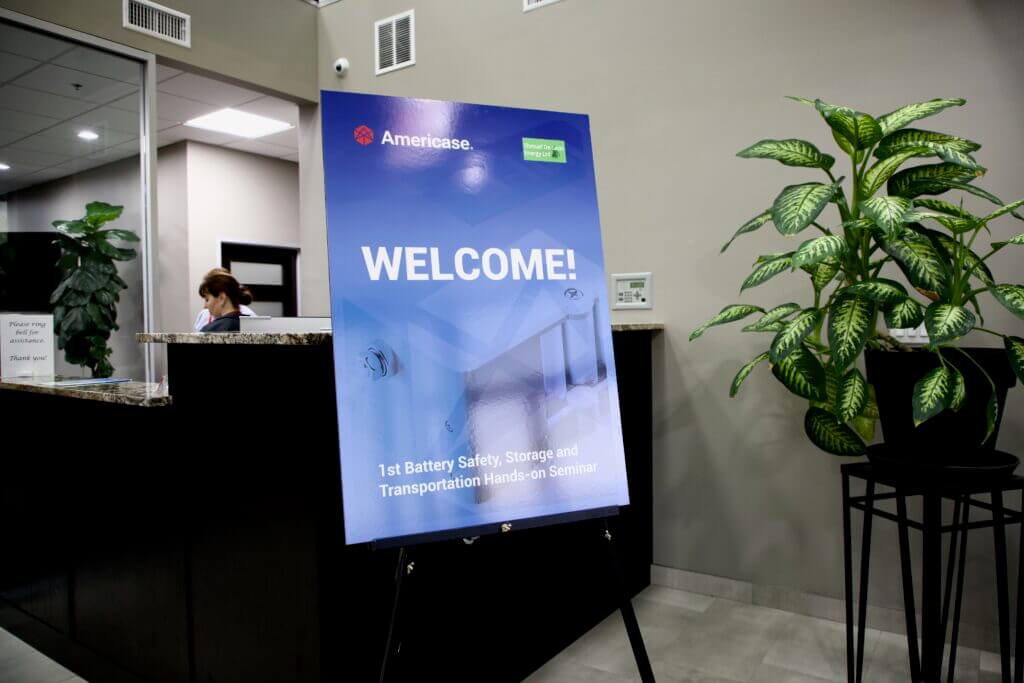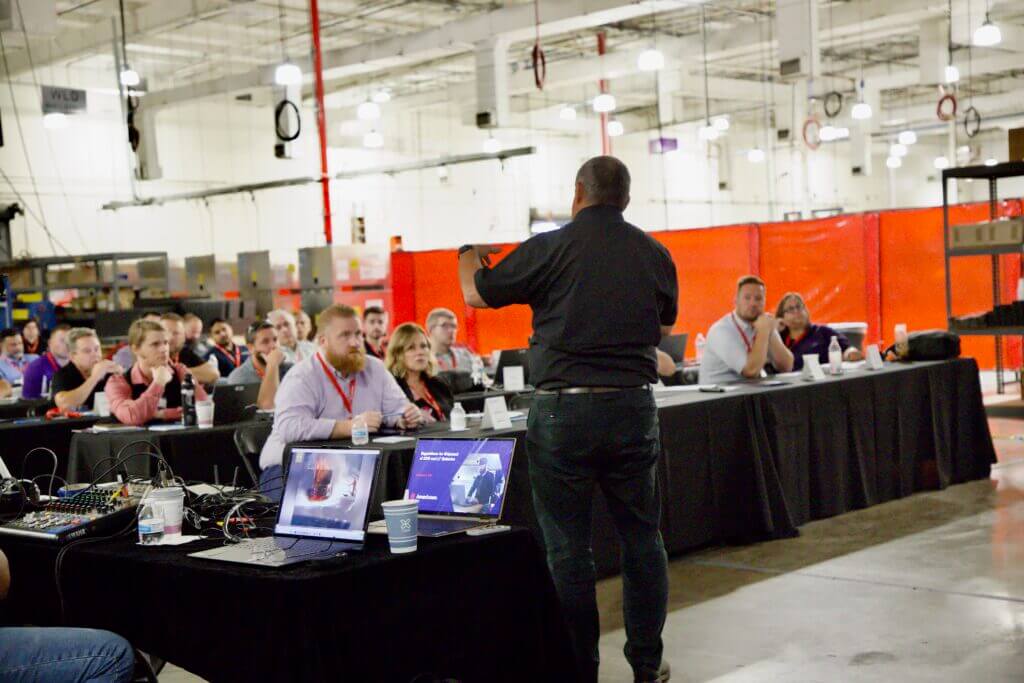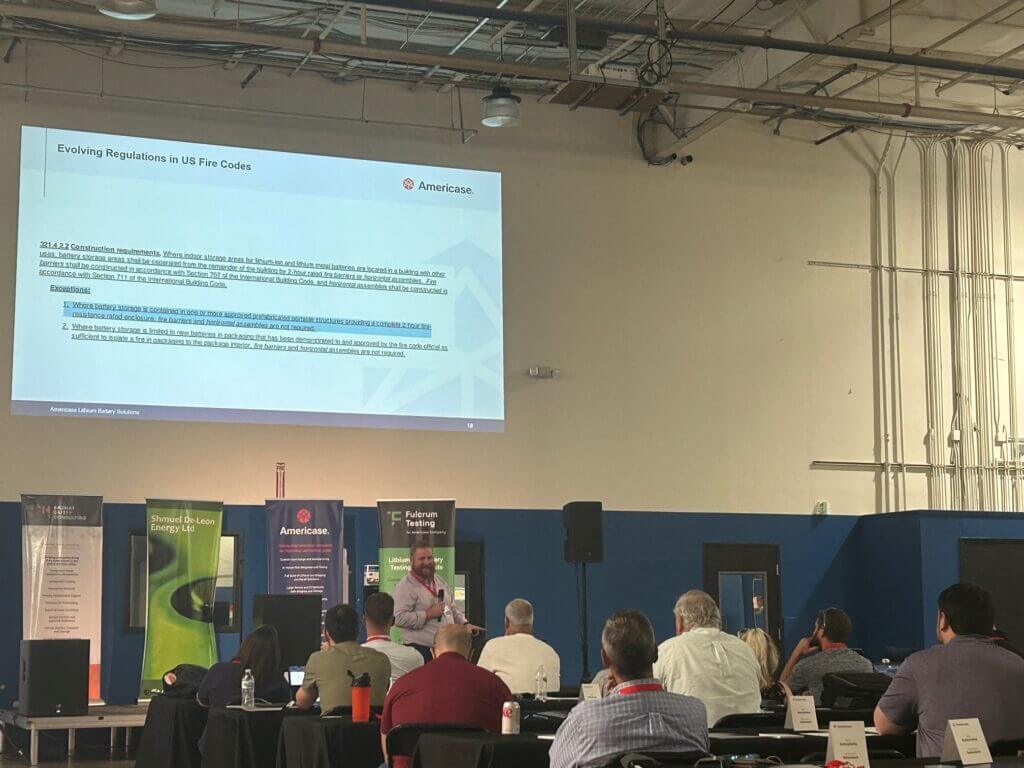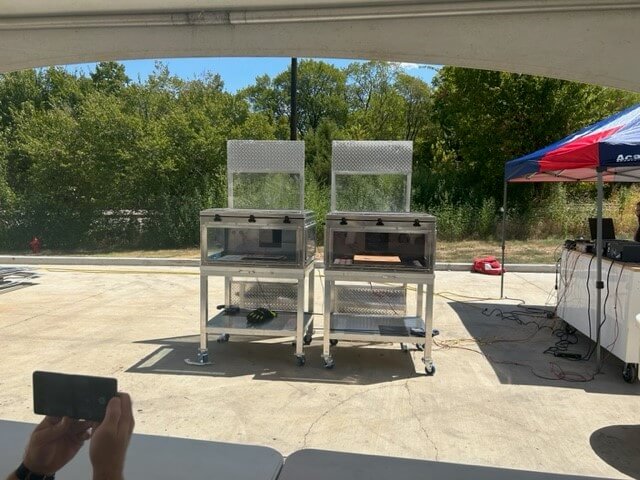Battery Safety, Storage & Transportation Hands-on Seminar
February 22-23, 2024 | Americase, 6200 N-I35E, Waxahachie, TX 75165
This seminar focuses on the latest battery safety practices as well as delivers newest updates on safe battery storage, transportation and government regulations. In addition to expert-led interactive sessions, the seminar offers live demonstrations of battery safety testing and fire containment and a DOT certification training course.
Who Should Attend
- Battery & Electrochemistry Industry Members
- Battery Material Makers
- Battery Manufacturing Equipment Makers
- Data Center Operations Managers
- Fire Code Officials
- Facilities Managers
- Environmental, Health, & Safety Managers
- New Technology Startup Owners
- Potential Investors in Lithium Technology
- Academic Researchers
- Other Battery Industry Members






Photos from the last Battery Safety, Storage, & Transportation Seminar, held September 2023.
Pricing
Two-day seminar registration (excluding optional DOT Certification Training): $1,000
To include DOT Certification Training: $1,300
Includes soft copies of slides, breakfast/snacks/lunch, networking reception
You Will Learn About
- Battery Safety, Transportation, and Storage
- Battery Containment Equipment and Suppression Materials
- Field Battery Safety
- Latest Regulations and Standards for Lithium Batteries
- Live Demonstrations of Thermal Runaway Containment and Suppression
- Optional – DOT Certification Training Course
Location
Seminar will take place just outside of Dallas, TX:
Americase
6200 N-I35E
Waxahachie, TX 75165
Seminar Agenda
Click the triangle next to agenda items to see detailed descriptions below.
Thursday, February 22
8:45-9:15am | Registration, breakfast, networking
9:15-9:30am | Opening remarks, introductions
9:30-10:30am | Live Demo: UN IWG Propagation Test, by Raymond James
This live demonstration will show how to achieve thermal runaway propagation. It is the propagation test used by the UN IWG On Hazard-Based Classification Of Lithium Batteries And Cells. The purpose of the test is to create a worst-case testing condition to assess the risk of:
- Thermal Runaway propagation and if applicable, propagation rate from cell to cell
- Flame generation in the case of thermal runaway of a cell or multiple cells
- The maximum temperature of a of a cell or multiple cells in case of thermal runaway
10:30am-12:00pm | Navigating the Current and Future Landscape of Lithium-Ion Batteries: An Expert Panel Discussion
Moderator: Chris Egloff of Americase
Panelists: Ron Butler of Energy Storage Safety Products International LLC, Rich Byczek of Intertek, George Kerchner of PRBA, Mike Pagel of HazMat Safety Consulting, Matt Walker of Sedgwick
This panel of industry experts will address some of the hottest topics concerning lithium-ion batteries today and in the future. Discussion will include regulatory issues concerning battery storage and transportation, future fire code implications, as well as risk management and insurance considerations. The panel will also address how to prepare for battery recalls and how to best plan for battery end of life and recycling. The panel includes a Q&A session where the panelists will answer your questions, even those tough “elephant in the room” ones – no holds barred! Topics covered include:
- Battery storage and transport regulations
- Future fire code implications
- Insurance/Risk management concerns
- Recalls, end of life, recycling planning
12:00-1:00pm | Lunch + Live Demo: Battery Backup Unit (BBU) Thermal Runaway and Containment
Lunch and a show! Grab a plate and watch a live demonstration of the test that creates a worst-case testing condition to demonstrate the risk of, and the necessity to contain, the following:
- Thermal Runaway hazards in server room applications
- Challenges encountered with respect to risk mitigation of BBU/BESS (Battery Energy Storage System) Devices in storage and transportation
1:00-2:00pm | SAE G-27 and UN IWG Hazard Classification, by George Kerchner
George Kershner has led the the PRBA (The Portable Rechargeable Battery Association) for over 17 year. He is a top resource to the industry regarding the regulatory changes in the world of lithium batteries. Recently, updates have been made in the UN IWG Hazard Classification as well as the SAE G27, and this presentation will provide the attendees with the latest developments and changes.
2:00-2:45pm | Planning For The Eventuality of a Lithium Recall, by Chris Egloff
The lithium battery world is in a state of constant evolution. Such frequent updates can create numerous changes within battery chemistry, engineering/logistic processes, and many others, all of which create a risk of a recall. This session will provide guidance in understanding the intricate steps and considerations of the recall process, including:
- How the right packaging provider can ease the burden
- The value of 3rd party logistics
- Carrier evaluation and selection
Hopefully, a recall never occurs, however, investing time into planning for one can save money, time and heartache.
2:45-3:00pm | Afternoon break/refreshments
3:00-4:00pm | Lithium Battery Transportation: Keeping Up with Regulatory Changes, by Mike Pagel
As all lithium battery shippers know, the shipping regulations never stop changing. And, as we move into 2024, the dizzying pace of change continues. Regulators and industry stakeholders are busy with considerations of additional state of charge restrictions, specialized packaging standards for air transportation, and a completely revamped battery classification system.
While maintaining compliance with existing rules can be challenging, it’s vital that the battery industry is not blindsided by the disruptive changes in future dangerous goods regulations. In this presentation, HazMat Safety Consulting will update participants on the upcoming changes in the battery space that will affect shipments, including ICAO proposals on SOC restrictions, the SAE G-27 Lithium Battery Packaging Committee, the UN Working Group on the Classification of Lithium Cells/Batteries, and more.
4:00pm-5:00pm | Overview of Battery Safety Concerns, Risks, and Best Practices, by Ron Butler
Batteries are integral to our lives and ubiquitous, present real danger during transport, storage and charging. Batteries can fail resulting in a potential for fire and explosion. Industry partners, the federal government, manufacturers, and logistics companies are all seeking ways to better manage the battery safety issue. The following presentation will focus on identifying the risk, but more importantly defining current and future methods for safely managing batteries. This includes transport systems and better processes for moving and storing battery commodities. The presentation will help interested parties identify tools and processes for making battery ownership safer.
5:30-6:30pm | Networking reception with cocktails and heavy hors d’oeuvres.
This is an unparalleled opportunity for you to meet other industry professionals, make new business contacts, and have in-depth discussions with the presenters.
Friday, February 23
7:45-8:30am | Refreshments, networking
8:30-10:30am | Battery Safety, by Shmuel De-Leon
Batteries have become daily use components for many applications. New growing segments like EV and Grid storage batteries extend the traditional ordinary battery applications. In the race for energy density, we shouldn’t forget safety – as an example, the Samsung Galaxy Note 7 battery safety case. Unfortunately, we face daily safety events with injuries and severe damage. This seminar focuses on portable, stationary, and automotive battery safety along the battery life cycle (acceptance, testing, assembly, use, storage, transportation, and disposal). The training incorporates Shmuel De-Leon and other experts on battery safety, representing over 30 years of work in the field. The motivation behind the training is to provide attendees with the knowledge needed to safely handle and store the batteries in their organization and to support reduction in safety events.
Topics to be covered:
- Battery Safety Hazards: Videos and examples
- Battery Safety Guidelines: Recommendations on proper work with batteries (acceptance, testing, battery pack design, use, storage, transportation, disposal)
- Battery Safety Events: Recommendations on how to handle
- Battery Safety Equipment: Checklist for labs and warehouses
10:30-10:40am | Morning break/refreshments
10:40-11:30am | On-Site Storage of Lithium Batteries: Emerging from the Wild Wild West, by Mike Pagel
For many years, consensus standards for safe storage of lithium batteries did not exist. This left it up to each business to work with local fire code officials and insurers to come up with protocols that made sense for them. Lithium battery storage was the Wild Wild West. A new era of lithium battery storage starts in 2024. For the first time, standards for safe on-site storage of lithium batteries will be included in the 2024 International Fire Code. In this presentation, HazMat Safety Consulting will walk through these requirements, how they are enforced, and how businesses can get in compliance with these new standards.
11:30am-1:30pm | Lunch + Live Demos: Consumer Electronics Recall Packaging, SAE G-27 Reduced Cell Test, and StatX Fire Suppression
Grab a plate and see the following live demonstrations:
Consumer Electronics Recall Packaging
The purpose of the test is to create a worst-case testing condition to demonstrate the risk of and necessity to contain Thermal Runaway hazards in single device recall packaging.
SAE G-27 Reduced Cell Test
The purpose of the test is to demonstrate the ability of simulating package testing with surrogate cells to assist test labs, shippers, and manufacturers in offsetting costs associated with testing while maintaining test validity.
StatX Fire Suppression
The purpose of the test is to create a worst-case testing condition to demonstrate the ability of StatX fire suppression system to limit a constant and recurring violent flame often exhibited during a Thermal Runaway event.
1:30-4:30pm | DOT Certification Training: Lithium Battery Shipping (optional course; must be registered in advance), by Mike Pagel
This dangerous goods training course with focus on the shipping requirements for lithium batteries, ranging from small batteries that power consumer electronic devices to high energy batteries that power electric vehicles. The training course will cover:
- General Overview of DG Regulations
- Safety & Security Awareness
- Hazards of Lithium Batteries and Signs of Damaged Batteries
- UN 38.3 Testing Requirements & Classification of Prototypes
- Differences Between “Small” and “High Energy” Lithium Batteries
- How to Ship Lithium Batteries via US Highway, Ocean, and Air
- Required Packaging
- Hazard Marks/Labels
- Documentation
Upon completion of this streamlined course, participants will be certified to classify, package, label, mark, and document shipments of lithium batteries in accordance with US DOT 49 CFR, IATA DG Regulations, and the IMDG Code. Certificates of completion will be provided.
This course will certify attendees to ship lithium batteries. It will not certify to ship other types of dangerous goods (e.g., flammable liquids, compressed gases, corrosives, etc.)
Meet the Speakers

Shmuel De-Leon, Founder and CEO, Shmuel De-Leon Energy, Ltd
Shmuel is a leading international expert in the business of batteries. Prior to founding the company, for over 21 years Shmuel held various positions in battery electronic engineering, and as a quality control team manager. Shmuel holds a BSc. in mechanical engineering from Tel-Aviv University, an MBA in quality control and reliability engineering from the Technion Institute in Haifa as well as an Electronic Technician’s diploma. Shmuel has a deep knowledge of the battery technologies and market, and supports many customers as their main battery consultant.

Ronald M. Butler, CEO, Energy Storage Safety Products International, LLC (ESSPI)
Ronald M. Butler serves as CEO of ESSPI which provides specialized safety consulting interventions for the energy storage and battery industries. ESSPI is proud to be funded by the USDOT to identify safe battery packaging solutions for industry. Ron has served as a consultant on hundreds of battery fire safety interventions, training, and system design contracts with the automotive, aerospace, marine, consumer electronics, and battery manufacturing sectors. He serves as a subject matter expert for the National Fire Protection Association (NFPA), Underwriters Laboratories (UL), and many others, for battery-related safety concerns. He has written extensively on the lithium (ion) battery fire safety subject with much more to come. He holds a Master’s degrees in Instructional Systems Design and Human and Organizational Performance Improvement from Wayne State University in Detroit, MI. Ron’s background includes 25 years as a Detroit Fire Department officer.

Rich Byczek, Global Technical Director – Transportation Technologies, Intertek
Rich has over 25 years of experience in product development and validation testing, 20 of which have been spent at Intertek. Rich is experienced in the areas of energy storage, audio equipment, EMC testing and Quality Management. As Intertek’s Global Technical Lead for Electric Vehicle and Energy Storage, Rich sits on several SAE, IEC, UL and ANSI standards panels, and is an instructor for the SAE HEV Academy, lecturing on Testing, Standards and Regulations specific to Lithium Ion batteries and EV charging systems. He holds a Bachelor of Science in Electrical Engineering from Lawrence Technological University in Southfield, Michigan, and is based at the Intertek EV and Battery Center of excellence located in Plymouth, Michigan.

Chris Egloff, VP Sales Lithium/HazMat Division, Americase
Chris has over 15 years of industry experience, focusing on research and development of fire and heat mitigating containers and packaging, and testing batteries when pushed into thermal runaway. Chris is a member of multiple industry and standards organizations, including the Council on Safe Transportation of Hazardous Articles (COSTHA), The Rechargeable Battery Association (PRBA), Danger Goods Advisory Council (DGAC), and UN Sub Committee on the Reclassification of Lithium ion and Metal Cells. He is also an SAE G27 writing and voting member, and an advisor for the Medical Device Transport Council (MDTC).

Raymond James, Principal Engineer, Fulcrum Testing
Raymond designs and conducts destructive testing experiments to verify Americase packaging solutions satisfy customer and regulatory body safety requirements for shipping dangerous goods. Raymond has been in the industry since 2018 and is a member of multiple industry and standards organizations, including SAE G27, UN Informal Working Group on Hazard Classification of Lithium Batteries, and Battery Transportation Committee. He holds a Master of Science degree in Electrical Engineering from the University of Texas at Arlington.

George A. Kerchner, Executive Director, PRBA – The Rechargeable Battery Association
Mr. Kerchner has served as the Executive Director of PRBA–The Rechargeable Battery Association since 2006. He represents PRBA and its members in the United States and internationally on regulatory and legislative issues associated with the safe manufacturing, handling, transport, storage, and recycling of lithium batteries. Mr. Kerchner also works as a Senior Policy Advisor with the law firm of Wiley Rein LLP in Washington, DC with expertise on the domestic and international transportation of lithium batteries, electric vehicles, and portable electronic equipment.

Mike Pagel, Senior Consultant, HazMat Safety Consulting
Mike Pagel is a Senior Consultant with HazMat Safety Consulting. As a dangerous goods consultant, Mike partners with clients to improve their hazmat transportation programs. This includes creating customized training courses, conducting on-site transportation compliance audits, general consulting support, assistance with Special Permits & Approvals, and developing company shipping procedures. Mike supports a range of clients with lithium battery transport and storage compliance, including producers of medical devices, battery recyclers, electric vehicle makers, packaging manufacturers, and consumer electronics companies. Mike started in the industry in 2012 at PHMSA’s Hazardous Materials Information Center (HMIC) at DOT HQ in Washington, DC. For two years, Mike supported the HMIC by answering thousands of questions on PHMSA’s Hazardous Materials Regulations. In this role, Mike worked directly with PHMSA Rulemaking, Approvals & Permits, and Technical staff.

Matt Walker, Director Business Development, Sedgwick
Matt Walker is Director of Business Development for Sedgwick, where he has helped clients manage nearly 1,000 national and international product recalls. Matt assists in the scoping, plan development, and recall execution for a diverse set of industries including pharmaceutical, medical device, food & beverage, and consumer products. In his thirteen years with the company, Matt has worked on all aspects of product recalls from implementing recall prevention procedures to executing global recalls. Matt’s proven and efficient recall solution strategies have helped some of the biggest companies in the U.S. prevent, prepare for, and resolve product recalls. Matt has worked on numerous high profile lithium-ion battery recalls and assisted manufacturers and retailers with streamlining their processes for efficiency and cost effectiveness.
Cancellation Policy
Written notice only will be accepted:
Until January 21, 2024 – 50% refund; From January 22, 2024 – No refund
Area Lodging and Dining Options
If you are planning to stay in Waxahachie during the seminar, below please find links to some of the local hotels and restaurants.
Hotels
Hampton Inn & Suites Waxahachie
Fairfield Inn & Suites Dallas Waxahachie
Holiday Inn Express & Suites Waxahachie